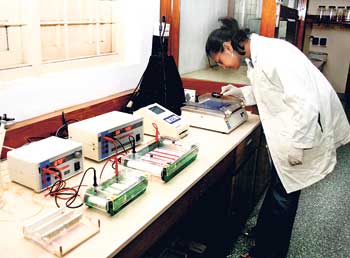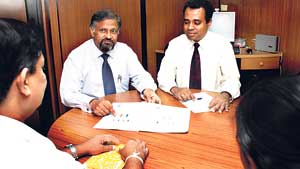
Getting to the core of the matterFrom genetic diagnosis to counselling, the Human Genetics Unit at the Medical Faculty of the Colombo University, provides an invaluable service to the people.
It runs in the family…... Does it really? This is what the Human Genetics Unit located at the Faculty of Medicine, University of Colombo, has been finding out for thousands of people in a silent service in the past 25 years. Many are the men, women and children who have sat in the tiny but cosy counselling room, conspicuously sans a telephone, to prevent interruption, where the tears have flowed, when grappling with the reality of something not being right with the genes. Here too have they found the strength, after hours of gentle but also factual discussions, to take decisions and move on. Begun slowly but now moving ahead rapidly, the person behind the hard work which started off as a one-man unit, Professor Rohan W. Jayasekara explains the beginnings. Prof. Jayasekara, armed with an MBBS, joined the Faculty of Medicine, Colombo, as a lecturer in anatomy, then headed for England as a Commonwealth Research Scholar, obtaining a Ph.D in Human Genetics from the University of Newcastle upon Tyne. Returning to Sri Lanka, he established the first Human Genetics Unit in the country two years later in 1983.
This unit which celebrates its silver anniversary, is to date the only stand-alone centre in the country, offering comprehensive genetic diagnoses, pre and post test counselling and preconception counselling.“We began a monthly clinic then,” says Prof. Jayasekara recalling those first years when there was “much pleading and plodding”. But the course was set and it took 17 years to recruit the next person because he explains “you need to get the right person, not just with the right qualification but also with the right temperament, attitude and gentle communication skills in dealing with other people”. The Founder Director of the unit and Prof. of Anatomy was “very selective” and it was Dr. Vajira H.W. Dissanayake who was taken on board after much whetting as empathy and sympathy are essential ingredients. Now there is a third who has gone for Ph.D studies in Medical Genetics. “We are set for awhile,” smiles Prof. Jayasekara, with a great sense of relief and satisfaction adding that succession planning has now been achieved. The unit is now self-funded and independent, its survival not depending on the University of Colombo, which initially supported it fully whenever a request was made. And what does the Human Genetics Unit, recognized by the World Health Organization as a centre of excellence, do? The terms are jaw-breaking but the work deals with the innermost core of a human being – genes and chromosomes and of course troubled minds and sensitive hearts.“All of us have 46 chromosomes and inside these chromosomes are many genes, about 30,000. Any defects in the chromosomes or in the genes can cause genetic disorders,” explains Prof. Jayasekara. Genes, inherited from parents, determine the physical traits of a person such as whether he will have straight or curly hair, the colour of his eyes etc. The genes hang on thread-like chromosomes which come in pairs. Both the chromosomes and genes are made of DNA (deoxyribonucleic acid). Chromosomes are found in cells, the small units which make up living things, The Sunday Times understands. A cell nucleus contains 46 individual or 23 pairs of chromosomes, half of which come from the father and the other half from the mother. Some genes don’t work right and the two types of genetic tests to determine this handled by the Human Genetics Unit are Cytogenetics and Molecular Genetics. Cytogenetic tests carried out to study normal and abnormal chromosomes would indicate infertility and sterility; multiple congenital malformations and mental retardation such as one sees in Down Syndrome. Molecular genetics is the study of the DNA patterns or sequencing which when there are changes could cause diseases or metabolic disorders such as the conditions affecting the clotting of blood (genetic thrombophilias), diabetes, hypertension, cardiovascular disease or disability. Research takes pride of place in the unit with recent groundbreaking work resulting in the discovery of one of the genes (EGF gene) which determines the weight of babies at birth. These findings by Dr. Dissanayake and published in the European journal ‘Molecular Human Reproduction’ are expected to have a major impact on the lives of people in view of the fact that people with low weight at birth are known to be predisposed to hypertension, cardiovascular disease and diabetes in adult life. In the field of education at the undergraduate and postgraduate levels the contributions are immense. The undergraduates in Colombo and many other faculties receive training in medical genetics and in postgraduate education, courses, electives and appointments in medical genetics are conducted for the Institute of Postgraduate Medicine (PGIM) and many professional colleges.
The unit has also conducted a neurogenetics clinic and collaborated with ICTA and the Nenasala Network around the country to provide remote genetic consultations (Telegenetics) for people in rural areas. At the beginning, though the unit did genetic testing free of charge, now due to the high costs involved, it has been compelled to charge a small fee to break even, says Prof. Jayasekara. Explaining the important work done, Prof. Jayasekara takes the heart-rending case of a woman who sought the unit’s services. Usually, he says, the thinking is that children of older mothers are more likely to be born with Down Syndrome.“In her case, she was young. Her firstborn had Down Syndrome and died soon after birth from a heart defect. The second baby she miscarried most probably because that foetus too had Down Syndrome. The third child however was fine and is now 11 years old. This woman’s marriage failed and she remarried and once again the first and second pregnancies were miscarried. In the third pregnancy, the obstetrician directed her to us and we found through tests that she had what is called a ‘balanced translocation Down Syndrome carrier status’,” says Prof. Jayasekara explaining that it is not due to extra or missing chromosome material (as in Down Syndrome) but because of a “rearrangement of chromosome material”. Such a person may have fertility problems (trouble becoming pregnant), miscarriages or an increased chance of having a child with health problems. Her brothers and sisters may also have inherited the translocation and testing will help them take important decisions as to whether they would like to have a baby, even with such risks, or adopt a normal one. When asked whether there was any purpose in finding out about a baby’s birth defects before the baby is born as abortion is illegal in Sri Lanka, he stresses that most parents want to know. Once counselling is done they make up their minds, said Prof. Jayasekara stressing that unlike in Down Syndrome, there are many other instances where foetal intervention helps immensely. Adds Dr. Dissanayake: “For certain metabolic disorders, treatment can be started pre-natally.” Attributing the success of their services not only to their skills and dedication but also to the grace and blessings received from “up there” Prof. Jayasekara says whoever crosses their path remains a friend for life. “It is the closest contact, both physical and emotional, with a human being. We hold their hearts in our hands but we don’t make the decisions for them.” No wonder then that their motto which adorns the greeting cards sent from the unit during the festive season says, “We feel, we care”. The proof of the faith in the Human Genetics Unit is evident……..for many who have crossed its threshold have named their little ones Rohan. |
|
||||||
|| Front
Page | News | Editorial | Columns | Sports | Plus | Financial
Times | International | Mirror | TV
Times | Funday
Times || |
| |
Reproduction of articles permitted when used without any alterations to contents and the source. |
© Copyright
2008 | Wijeya
Newspapers Ltd.Colombo. Sri Lanka. All Rights Reserved. |

